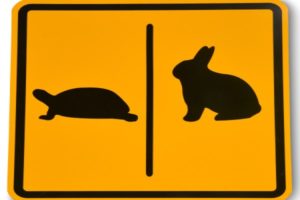
Recent reports of a sharp increase in the number of South African patent applications that are being filed along with requests for expedited acceptance brings to mind the well-known fable of the tortoise and the hare.
The hare, confident in the superiority of its speed, challenged the tortoise to a race. The hare quickly builds up a lead, takes a nap along the way, but is ultimately beaten to the finish line by the slower yet consistent tortoise. What can be learnt from this story with regard to patent prosecution?
In South Africa, a request for expedited acceptance is a useful tool to progress patent applications to grant rapidly, considering that grant follows within three months of acceptance. However, using this tool early on in the prosecution of a patent application may come at a cost that far outweighs any perceived benefits of obtaining a quick grant, manifesting in a lack of enforceability and commercial value.
The South African Patent Office does not currently conduct any substantive search and examination of patent applications and, as of late, has been processing some patent applications that have been filed along with requests for expedited acceptance extremely quickly, within days in some cases.
Unsurprisingly, there have been foreign applicants that have sought to take advantage of this practice, in most cases to claim financial incentives in their home countries.
Although obtaining expedited acceptance and grant of South African patent applications has been readily available for decades, informed applicants have generally shied away from utilising it early on in prosecution, rather slowing down the prosecution of their South African applications than to speed it up. Applicants that follow the expedited route often do not fully appreciate the risks associated with the quick acceptance and grant of their patent applications.
If a patentee is interested in obtaining valid and enforceable patent rights with commercial value in South Africa, there are several important factors that need to be considered and attended to before a South African patent application should be allowed to proceed to acceptance and grant.
Most prominently, South African courts have over time developed a large and sophisticated body of judicial precedents with respect to the validity and enforcement of patents. In doing so, the courts have placed a heavy onus on patent applicants to ensure that their patent applications proceed to grant in a valid form and courts have recently been hesitant to come to the assistance of patentees who fail to do so. In Gallagher v IO Tech[1], the Court reiterated that “It is in the interest of public policy to ensure that patentees only file patents for inventions which they believe are valid, thereby protecting the patent system against abuse.”
Failure to discharge this onus will in most cases lead to irreversible hardship for patentees in seeking to enforce, or attaching any meaningful value to, their patents.
For example:
– a single invalid claim in a patent will result in the unenforceability of other valid and infringed claims until such time as the invalidity has been cured, if at all possible (partial invalidity);
– should a patent application be allowed to proceed to grant with claims which the applicant knew, or reasonably ought to have known, to be invalid (i.e. as a result of a negative PCT search or examination result, for example) the patent stands to be invalidated for the rest of its term on the basis of a material misrepresentation made by the applicant in the statutory required Form P.3 (being a combined declaration and power of attorney) filed in support of the application (material misrepresentation); and
– any undue delay by the patentee in making a necessary amendment, when the patentee knew or had constructive knowledge of the invalidity of the claims, can in certain circumstances result in a court refusing the amendment (culpable delay).
A number of prosecution advantages, including broadening, extension and safeguarding of patent rights, can and should generally be achieved prior to acceptance and grant, through the filing of divisional applications (divisional patents) and pre-grant amendments.
It is therefore critical that patent applicants obtain advice from competent and experienced patent counsel on all aspects of their patent rights, including, but not limited to, partial validity, material misrepresentation, culpable delay, divisional patents and pre- or post-, grant amendments, before any South African patent application is allowed to proceed to acceptance and grant.
Our recommended course of action remains that acceptance of South African patent applications should be delayed until examination of corresponding applications filed in examining jurisdictions have proceeded to grant, that the filing of divisional patent applications should be considered in appropriate cases, and that the claims of the South African applications should be amended before grant to take the outcomes of such examinations into account. This approach will most likely ensure that the patent application proceeds to grant with a valid and enforceable set of claims and that no material misrepresentation is made on the Form P.3 declaration.
Don’t be the hare, beaming at the prospects of obtaining a quick patent grant. You may be caught napping at a critical time, which could be at the expense of forfeiting your valid patent rights.
At Adams & Adams we have the necessary capacity, experience and technical expertise developed over more than 110 years to assist patent applicants to extract the best value from their inventions and to obtain valid and enforceable patent rights. For expert and trusted advice on how best to protect your valuable patent rights in South Africa, and the rest of the African continent, please reach out to us at [email protected].
[1] Gallagher Group Ltd and another v IO Tech Manufacturing (Pty) Ltd and others 2013 BIP 45 (CP)
Wilhelm Prozesky
Partner | Patent Attorney
Email: [email protected]
Danie Dohmen
Partner | Patent Attorney
Email: [email protected]
Pieter Visagie
Partner | Patent Attorney
Email: [email protected]
